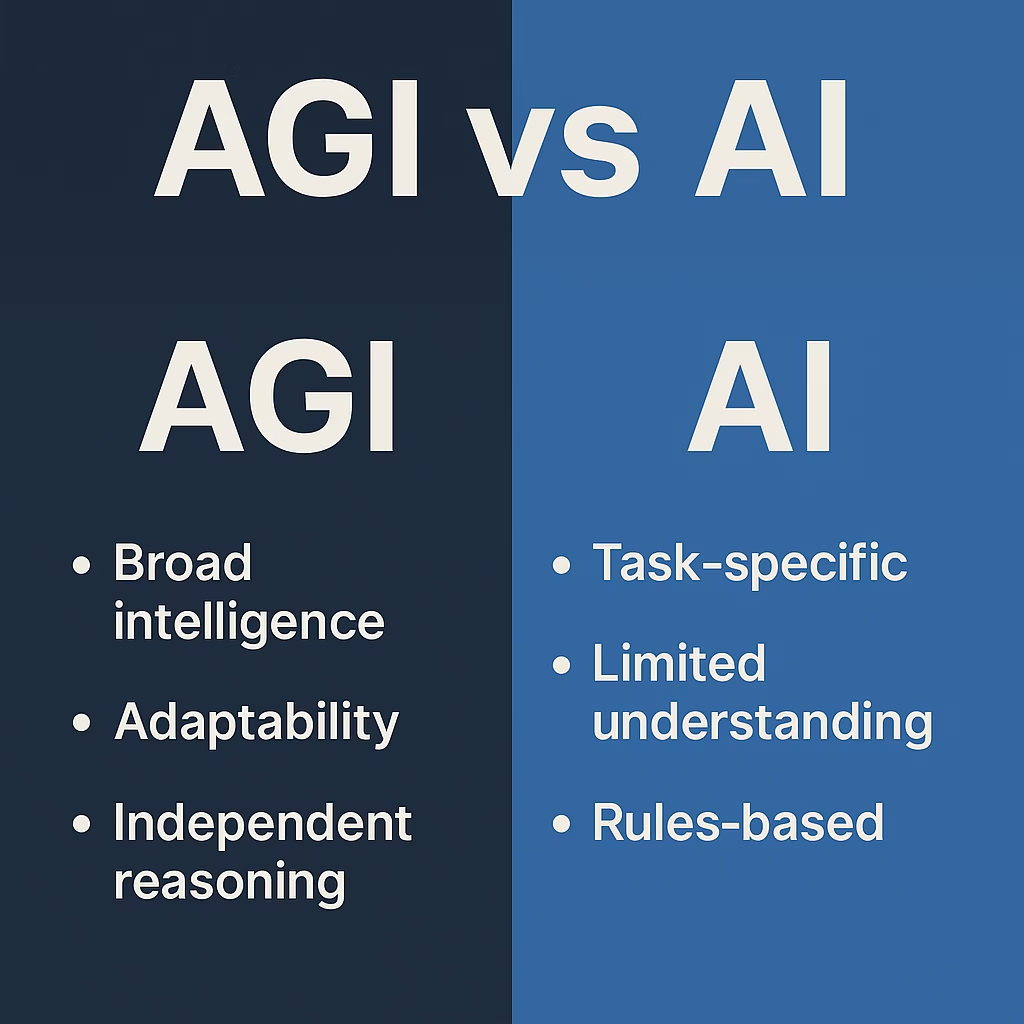What Does AGI Mean in AI?
Artificial General Intelligence, often referred to as AGI, is the concept of a machine capable of understanding, learning, and applying knowledge across a wide range of tasks—just like a human. Unlike narrow systems designed for specific roles, AGI would be able to reason, adapt, and operate without strict programming limitations.
In simple terms, AGI represents the vision of creating technology that doesn’t just follow instructions but thinks independently, making decisions across multiple domains with genuine problem-solving ability.
How Is AGI Different from AI?
The difference lies in scope and flexibility. Traditional systems are narrow and specialized. They excel at pattern recognition, data processing, or language-based interactions but fail outside their defined domain. AGI, on the other hand, would be versatile—capable of shifting between tasks without retraining or reprogramming.
AGI vs AI

When comparing AGI vs AI, the contrast becomes clear:
- AI: Task-specific, limited understanding, rules-based.
- AGI: Broad intelligence, adaptability, independent reasoning.
What Level of AI Is AGI?
Researchers often classify intelligence into three levels:
- Narrow systems (current stage).
- General systems (AGI).
- Super systems (beyond human capacity).
AGI sits at the middle tier—more advanced than today’s applications but not yet at the stage of surpassing human intelligence.
How Does AGI Work?
The theory behind AGI involves combining cognitive models, reasoning frameworks, memory functions, and self-learning mechanisms. In practice, this would require machines to simulate human-like awareness—learning from minimal data, reasoning in uncertain situations, and applying knowledge beyond pre-set instructions.
AGI vs Other Paradigms
What’s the Difference Between Generative AI and AGI?
Generative models create new content—text, images, or music—based on training data. They are impressive but still narrow in scope. AGI, by contrast, would not just generate; it would comprehend, plan, and act across entirely different problem spaces without being retrained.
AGI vs Generative AI
Generative models are powerful creative assistants. AGI would be a true problem-solver with human-like versatility. The distinction lies in depth of reasoning and adaptability.
AGI vs ASI
Artificial Super Intelligence (ASI) refers to systems exceeding human capacity in all domains. AGI aims for parity with human reasoning; ASI surpasses it. The step from AGI to ASI remains hypothetical but sparks debates about control, ethics, and governance.
Artificial Super Intelligence
ASI would represent the ultimate stage of technological intelligence, capable of breakthroughs and strategies no human could match. It remains a theoretical construct, often portrayed in futuristic discussions about civilization’s direction.
ChatGPT & AGI—Clearing the Confusion
Is ChatGPT AGI or AI?
ChatGPT is a sophisticated model but not AGI. It functions within its trained parameters, excelling at language-based tasks but lacking the self-driven reasoning of AGI.
What Type of AI Is ChatGPT?
It is a large language model—a type of system designed to predict and generate text based on patterns it has learned.
Does ChatGPT Use AGI?
No. It operates within the narrow paradigm of predictive language generation. While advanced, it doesn’t display the independent reasoning or adaptability required to qualify as AGI.
Is ChatGPT AGI?
The answer remains no. It is an advanced system within the broader family of narrow systems.
Where We Are Today
Has OpenAI Achieved AGI?
No company has achieved AGI yet. While significant progress has been made in natural language processing, robotics, and predictive analytics, AGI remains an aspiration.
Which Companies Are Developing AGI?
Several global players are actively researching the field, including:
- OpenAI
- Google DeepMind
- Anthropic
- Microsoft Research
- Meta Research
Each pursues different pathways, from reinforcement learning to neural architecture development.
Is AGI Possible?
Experts remain divided. Some believe breakthroughs are inevitable within decades, while others argue the complexity of human cognition may never be fully replicated.
Examples, Types, and the Road Ahead
Artificial General Intelligence Examples
At present, true AGI examples do not exist. Hypothetical use cases, however, include:
- A machine capable of diagnosing medical conditions, then switching seamlessly to designing architectural blueprints.
- A digital assistant managing household tasks, professional work, and personal tutoring—all without reprogramming.
AGI Examples
Because AGI remains theoretical, most references to examples are speculative scenarios rather than real-world products.
What Are the Four Types of Generative AI?
- Text generation (chatbots, content creation).
- Image generation (artwork, design).
- Audio generation (music, voice synthesis).
- Video generation (animation, editing).
What Happens When AI Reaches AGI?
If realized, AGI would reshape industries, economies, and human life. Potential outcomes include:
- Radical advances in medicine, science, and technology.
- Major ethical and governance challenges.
- A fundamental shift in how humans work and interact with machines.
Conclusion
Artificial General Intelligence represents one of the most ambitious pursuits in technology. While current systems showcase remarkable capabilities, they remain limited compared to the adaptability of true general intelligence. The path forward involves innovation, debate, and careful management of potential risks. As companies and researchers race toward breakthroughs, the journey from narrow systems to AGI—and possibly ASI—will define the future of humanity’s relationship with technology.
